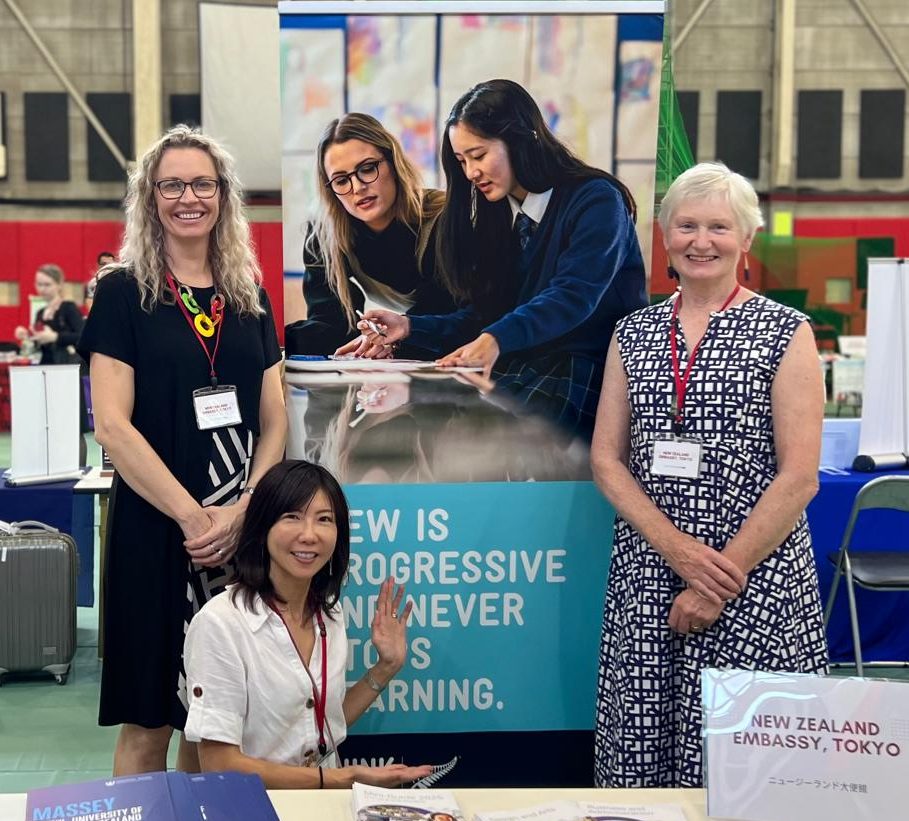
News
International engagements lead to enrolments
Japanese education providers and students are booking Whanganui visits following successful international education engagements with local secondary schools.
From the tech world of San Francisco to a finishing block in Fordell - David Eade continues a journey to create better outcomes.
A finishing block in Fordell feels worlds away from San Francisco’s tech scene, but innovation and progress take many forms and David Eade is finding new inspiration in the paddocks of Whanganui.
Eade, who recently returned from six years building teams and products in San Francisco’s tech industry, is the first recipient of two new scholarships created through a partnership between Whanganui & Partners and New Zealand Rural Leadership Trust.
The scholarships, to be awarded annually, are worth $2500 and are designed to build entrepreneurial capital in Whanganui’s food and fibre sector.
This is not Eade’s first step into a paddock, he grew up on a sheep and beef property in north Waikato and is General Manager of Apiary Solutions, a tech company focused on unlocking the potential of bees.
Eade’s story mirrors that of so many recent returnees who are reconsidering what is important to them and where life is best lived, “We’ve sort of gone full circle,” he says.
“I got told to steer away from farming. I shot off overseas, and now we’ve come back to the land.”
Eade’s wife, Harriet, is from Whanganui. The couple returned to New Zealand just over six months ago, during lockdown, with a pre-schooler and a baby on the way.
At their finishing block in Fordell, which they have owned for three years and is nearing the end of a lease agreement, Eade plans to improve ecological equity and high-quality produce through regenerative agriculture.
Spurred on by the prospect of leading the primary sector as it tackles an ever-changing market, Eade is undertaking a Nuffield New Zealand Farming Scholarship – a requirement to be eligible for the Whanganui & Partners and New Zealand Rural Leadership Trust scholarship.
He wants to be part of agriculture’s transition towards an industry driven by consumer preferences, where the market is well understood and technology is utilised optimally for both consumer and producer.
His time in the States reinforced the growing importance of provenance to the consumer. The American approach was complicated by feedlots and vast geography, he said, but seeing the story that they tell around their food was inspiring.
“It was interesting to see how the story [of regenerative agriculture] resonated, it’s obviously getting a lot of momentum over there, and it resonates with consumers and growers,” he said.
“And I think it’s not only the practice of it, but it’s reconnecting people with the land, it’s tightening supply chains. I think it’s healthy for communities.”
Regenerative agriculture means different things to every country, he says, but we need to position ourselves to our best advantage.
“What I’m interested in is how to incentivise change. So, getting the right structures in place, whether it be financial or otherwise,” Eade says.
“Because it feels like there’s a lot of stick out there at the moment, and not so much carrot.”
At the property in Fordell, Eade’s plan is to build ecological equity. He’ll work with neighbours to create pollinator and bird corridors, “we want to reduce the inputs on this place, we want to do it all with nature, is how we view it”.
There’s a lot of trial and error ahead, Eade says, but regenerative agriculture is gaining interest in Whanganui and the commitment is long-term.
The Nuffield scholarships are intended to be internationally focused, Eade says. To look at better ways of doing things and bring them back to New Zealand.
But COVID has caused a rethink and this year’s scholars are concentrating on home turf first.
“We’re going to go deep into the New Zealand side of things to start with, kicking off with a three-week New Zealand tour,” Eade said. “I think the focus of that is going to be the world of COVID. How we position ourselves as we go forward.”
Colleen Sheldon, Whanganui & Partners Strategic Lead – Agribusiness, said Eades’ project perfectly met the aim of the scholarships.
“David’s forward-looking approach and excellent understanding of how technological uptake is crucial to the future of farming meets the scholarships’ objectives perfectly,” Sheldon said.
Taking a regenerative approach, and studying its benefits to a sector under constant pressure to adapt to environmental and consumer demands, would benefit the region in knowledge and productivity, she said.
Whanganui & Partners has entered into a multi-year agreement with the New Zealand Rural Leadership trust to offer the scholarships, which are granted to Whanganui residents or scholars who directly contribute to the region’s agribusiness sector.
The scholars must be undertaking a Kellogg Rural Leadership Programme or a Nuffield Farming Scholarship. The Kellogg Leadership Course has three intakes a year, applications to the Te Tai Tokerau-based course closed in early February and the Lincoln-based course applications close early March.
Photo, left to right: Colleen Sheldon (Whanganui & Partners Strategic Lead – Agribusiness), David Eade (Nuffield Scholar), Andrew Watters (Chair of New Zealand Rural Leadership Trust).



Register to gain access to the Discover Whanganui resource hub.